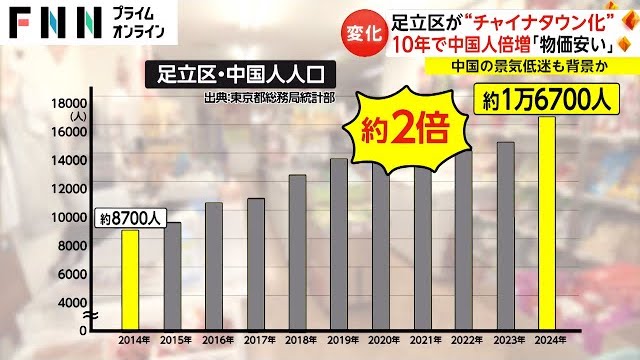TOKYO, Mar 15 (News On Japan) - A residential district in northeast Tokyo is currently undergoing a reformation, with rows of authentic Chinese restaurants, Chinese-style hair salons, and supermarkets displaying signs exclusively in Chinese.

Takenotsuka in Adachi Ward has doubled its Chinese population in a decade.
Entering a store that just opened one month ago, the menu is entirely in Chinese. The food being eaten by customers is also, for the most part, rarely seen in Japan.
In a "serious Chinese eatery," the taste of China is brought over directly.
Soft tofu topped with a thick sauce, a staple Chinese breakfast, its name is "tofu brain."
Chinese regular customer: "It's very delicious! It tastes like my hometown."
A duck dish simmered at low temperature over a long time is also popular.
Many Chinese have become regular customers.
Chinese customer: "The price is cheap. I've come to this store about 4 or 5 times already."
Why are Chinese people moving to Takenotsuka?
Chinese resident in Takenotsuka: "Houses are cheap, and prices are low."
According to a local real estate agency, renting a one-room apartment in central Tokyo costs about 80,000 yen per month, but in Takenotsuka, it can be as low as 30,000 yen.
Chinese resident in Takenotsuka: "I moved here through a coworker's introduction. Everyone is living here."
Experts point out that the rapid increase in Chinese people in Takenotsuka is related to the rising unemployment rate in China due to the economic downturn.
A China expert commentator explained: "In China, unemployment is spreading, and companies are going bankrupt. Small and medium-sized business owners, or individual store owners, have no work in China, so they are going out to find new worlds."
Source: FNN














